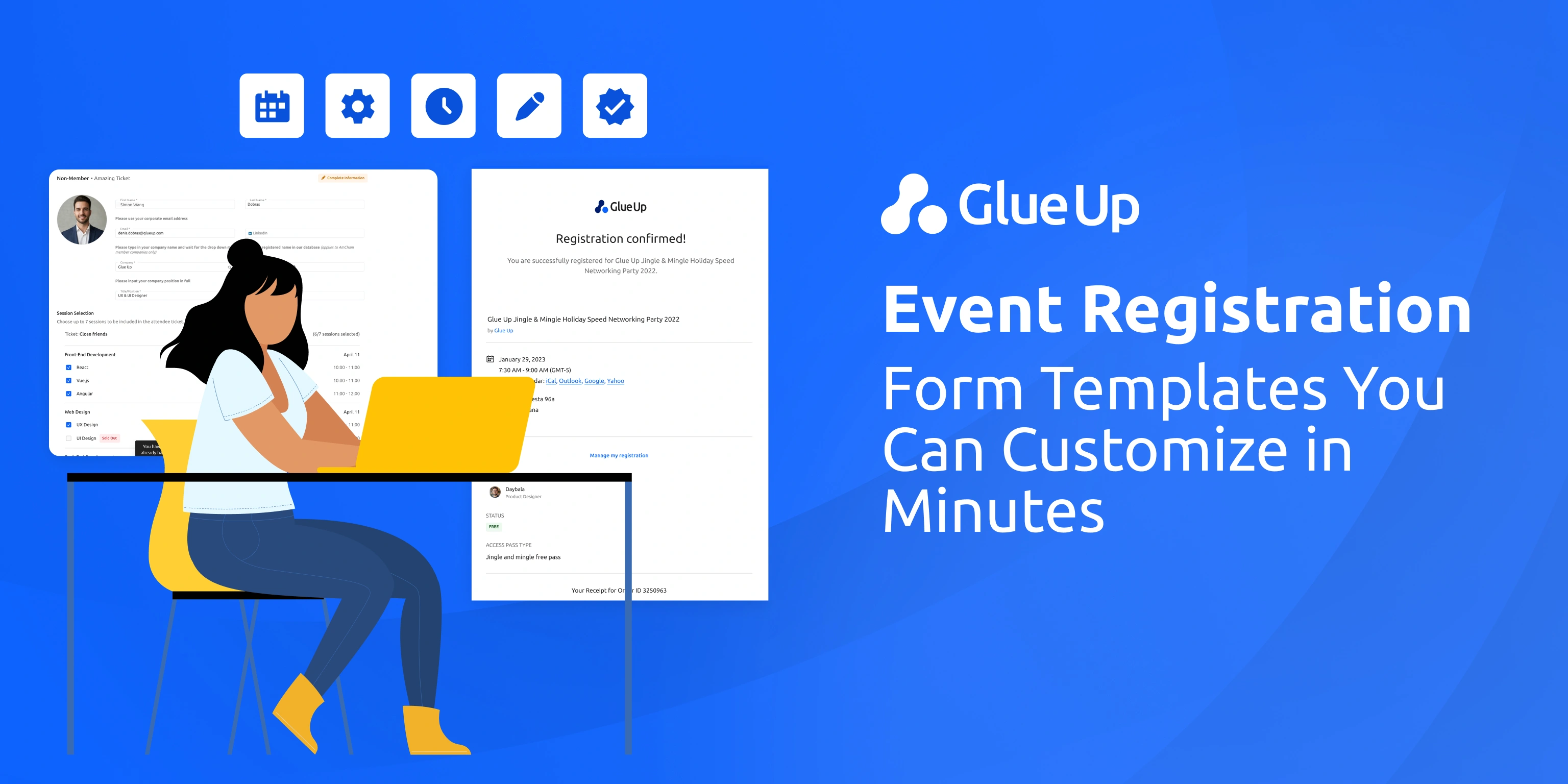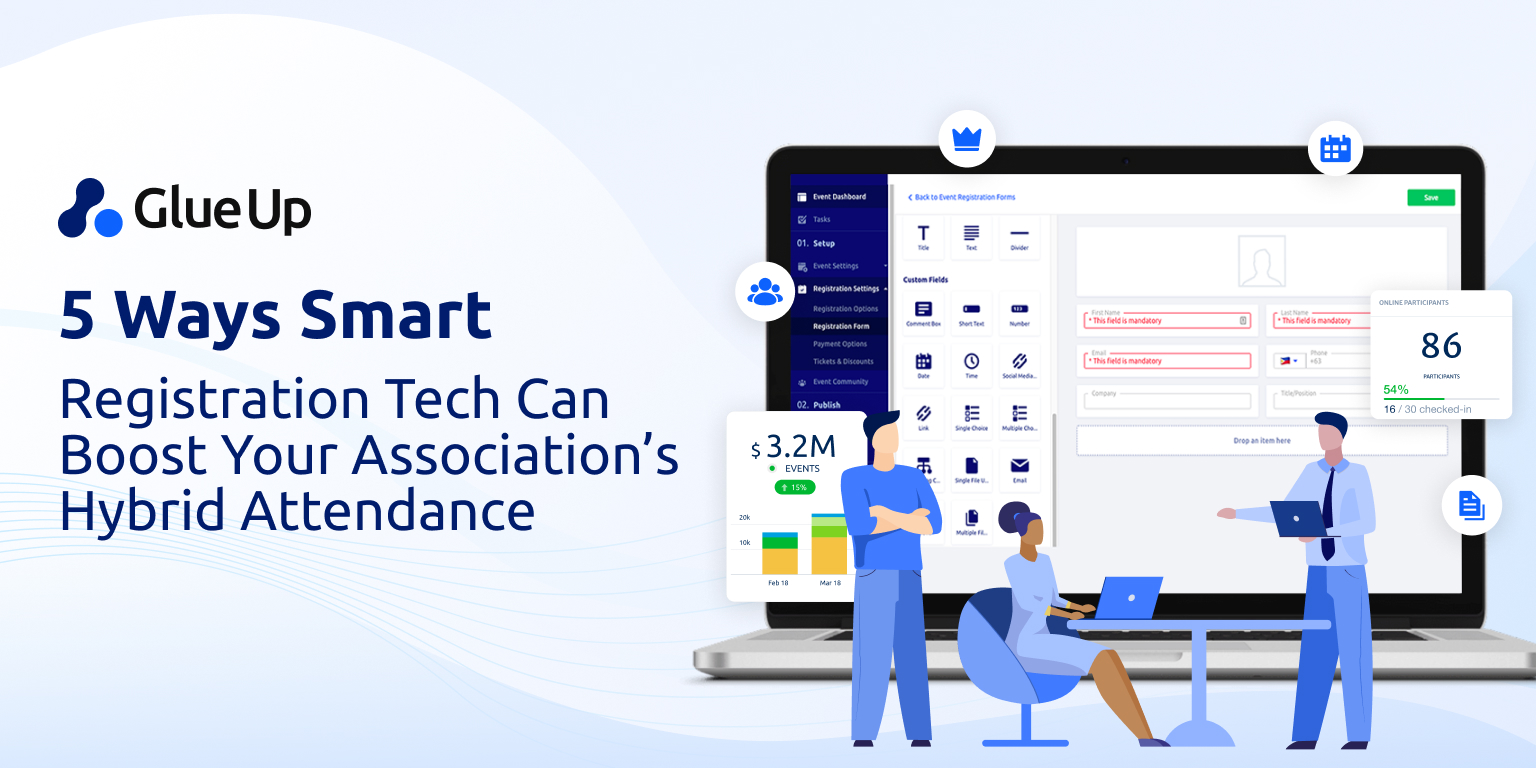
Event registration forms are often the first test of your event’s professionalism. If it’s long, outdated, or confusing, people drop off. That’s why many organizers now start with event registration form templates. These are ready-made structures that collect the right data, reduce friction, and keep the sign-up process fast. According to Eventscase, clear, well-organized forms can significantly lower abandonment rates.
This is the same principle we covered in our guide on membership forms: clarity wins. So, before you create a registration form template for event, know that structure is what keeps friction low. For events, however, templates take it further by giving you the flexibility to adjust fields for a networking mixer, a multi-day conference, or a virtual workshop without ever starting from scratch.
In this post, we’ll break down the factors to consider when designing registration forms, how templates save busy associations and chambers time, and share examples you can copy into your next event immediately. Each example below can be used as an online event registration form or adapted into a printable version depending on your audience.
Make Registration Smarter with Glue Up’s Event Management Software
Running events means balancing dozens of moving parts, and registration should not be one of the bottlenecks. Glue Up’s event management software gives you drag-and-drop tools and ready-made templates so you can launch polished forms in minutes. You can also create an event registration form online and instantly connect it to payments, membership records, and reporting.
- Build and edit forms without coding
- Sync registration data directly to CRM, finance, and membership modules
- Duplicate successful event setups with blueprints
- Keep every form on-brand with your logo, colors, and layouts
Book a demo today and see how Glue Up helps you manage registration more efficiently.
Key Takeaways
Using an event registration form template or event registration form design framework saves time, reduces errors, and improves attendee experience.
Different event types require different templates—networking, conferences, workshops, sponsorships, and virtual events each need tailored fields.
Factors to consider include event type, audience expectations, required vs. optional fields, compliance, integrations, and mobile usability.
Glue Up’s event management software provides drag-and-drop builders, automation, and blueprints to simplify registration and keep data consistent.
Using templates is not just efficient; it directly supports higher registration rates, stronger member engagement, and better event ROI.
Why Event Registration Form Templates Matter
A registration form is often the first impression of your event. If it looks outdated, asks too many questions, or takes too long to complete, attendees will abandon it. According to FormStory, nearly 30% of people leave sign-up forms unfinished when they feel overwhelming.
Consistency Across Events
Templates provide a framework you can reuse for every event. They keep your forms professional, branded, and error-free while allowing quick edits for different formats—whether it’s a multi-day conference or a single networking reception.
Faster Setup for Organizers
Starting from scratch each time wastes hours. Templates let you duplicate, adjust, and publish in minutes so you can focus on speakers, sponsors, and logistics instead of form design.
Better Data Quality
Structured fields reduce errors and ensure the data flows into your CRM or event management system without duplicates. That accuracy directly impacts attendance tracking, sponsor reporting, and follow-up communication. That consistency is especially important when your event registration form questions include membership IDs, billing fields, or session preferences.
Improved Attendee Experience
Clean, short forms respect your members’ time. Templates guide you to ask only what’s essential, lowering the chance of drop-offs and boosting registration rates.
The Benefits of Association Event Registration Form Templates and Drag-and-Drop Tools
Templates alone save time, but paired with drag-and-drop editing they become a powerful tool for associations and chambers. Instead of wrestling with code or static documents, you design and publish forms that are fast, branded, and accurate.
Speed That Matches Event Timelines
Organizers often juggle dozens of moving parts at once. With templates, building or updating a registration form takes minutes instead of hours. That agility matters when you are handling multiple events a year.
Flexibility Across Event Types
A networking session requires very different details than a three-day conference. Templates let you adapt quickly, ensuring you only capture what’s necessary without overcomplicating the form.
Branding That Builds Trust
Generic forms can make even a major conference feel unpolished. Drag-and-drop design tools let you add logos, colors, and layouts that align with your brand, reinforcing credibility with every attendee.
Data Accuracy That Scales
Manual processes lead to errors. Templates standardize key fields like email, phone, or membership ID, and integrations push that data directly into your CRM. According to Statista, over 70% of event professionals now rely on integrated systems to eliminate duplicate records and reporting errors.
Factors to Consider Before Choosing a Template
Not all event registration form templates are created equal. The best ones balance attendee experience with the organizer’s need for accurate, actionable data. Here’s what to evaluate before you choose.
Event Objectives Define the Form
A half-day workshop doesn’t need the same level of detail as an annual conference. Be precise about what you want to achieve—whether it’s driving networking, segmenting attendees, or gathering sponsorship data—before finalizing your fields.
Audience Expectations Drive Completion
Senior executives expect brevity. Students may tolerate more questions. Your form should reflect who will be filling it out, otherwise you risk high abandonment rates and lower registrations.
Required vs. Optional Fields Impact Conversions
Every unnecessary mandatory field creates friction. Limit required fields to essentials and mark the rest as optional. This simple adjustment can significantly reduce drop-offs.
Compliance Protects Your Organization
If you collect personal data such as dietary needs or payment information, make sure the form aligns with GDPR, CCPA, or regional privacy laws. Include explicit consent checkboxes and links to your policies to safeguard your organization.
Integration Ensures Data Value
A template should connect directly with your event management, CRM, and finance systems. Without integration, your team spends time on manual entry that introduces errors and delays reporting.
Mobile Experience Is No Longer Optional
Over half of attendees register via mobile devices. If your form is not responsive and fast on smaller screens, you’re losing potential registrations before they begin. With the My Glue app, attendees can register, pay, and manage event details directly from their devices, giving them a faster, more reliable experience from the start.
Event Registration Form Templates You Can Use
Here are five simple yet effective event registration form templates you can adapt for different formats. Each one is structured for attendee convenience and organizer accuracy.
Disclaimer: These are just examples. Feel free to refine them according to your events and members.
Networking Event Registration Template
Networking events thrive on quick connections. This template captures the essentials that make it easy to identify and match attendees. This lightweight structure works well as a quick free event registration form when you want maximum participation with minimal friction.
First Name / Last Name (ensures accurate name tags and introductions)
Email Address (primary communication for reminders and follow-up)
Phone Number (secondary contact method for last-minute updates)
Company / Organization (adds professional context to networking conversations)
Title / Position (helps attendees find peers at the same career level)
Preferred Networking Topic (drop-down to cluster participants around shared interests)
LinkedIn Profile (optional but valuable for extending conversations after the event)
Annual Conference Registration Template
Large, multi-day conferences require more detail to manage sessions, logistics, and attendee expectations.
First Name / Last Name (critical for official badges and attendee lists)
Email Address (used for confirmations, agenda updates, and surveys)
Phone Number (necessary for time-sensitive communication onsite)
Company / Organization (gives context to sessions and sponsorship reports)
Job Title (helps segment attendees for workshops or marketing)
Membership ID (validates member discounts and tracks association participation)
Session Preferences (multi-choice for capacity planning and targeted follow-up)
Dietary Restrictions (ensures inclusivity in catering)
Accommodation Requests (streamlines logistics for traveling participants)
Consent for Photography and Recordings (protects the organization legally for media use)
Training Workshop Registration Template
Workshops are hands-on and skill-focused. This form identifies participant needs and levels of experience.
First Name / Last Name (required for certification or completion records)
Email Address (used for sending pre-reading and post-workshop materials)
Phone Number (backup contact in case of last-minute changes)
Company / Organization (provides context on where knowledge will be applied)
Department / Team (helps trainers understand group composition)
Learning Objectives (open text field for personal goals)
Previous Experience with [Topic] (multi-choice to gauge readiness and tailor content)
File Upload (for pre-assignments or portfolio samples if required)
Sponsorship / Exhibitor Registration Template
Sponsors and exhibitors require forms that combine participant details with logistical needs.
Company Name (anchors all sponsorship agreements and booth records)
Contact Person (main point of communication for planning)
Email Address (for confirmations, invoicing, and contracts)
Phone Number (critical for time-sensitive booth setup)
Sponsorship Tier (multi-choice to record package selection)
Booth Requirements (comment box for power, internet, or special requests)
Logo Upload (ensures branding is ready for signage and digital promotion)
Billing Details (provides finance teams with accurate invoicing data)
Virtual Event Registration Template
Virtual events demand clarity on technical setup and access preferences.
First Name / Last Name (required for login credentials and personalization)
Email Address (used for sending links, reminders, and recordings)
Phone Number (important for troubleshooting and urgent support)
Company / Organization (provides context for remote participation)
Title / Position (helps speakers tailor sessions to audience levels)
Country / Time Zone (essential for scheduling across global audiences)
Session Selection (multi-choice for assigning breakout rooms)
Preferred Platform (Zoom, Teams, etc., to match attendee preferences)
Opt-in for Recordings (ensures compliance before sharing replays)
Build Faster, Register Smarter
Event registration is not just a box to check. It is the first experience attendees have with your event, and it sets expectations for everything that follows. A confusing or outdated form can create frustration, but well-structured event registration form templates streamline the process, reduce errors, and present your organization as credible and professional.
Glue Up makes this easy. With drag-and-drop tools, automated workflows, and reusable event blueprints, you can launch branded forms in minutes. Data flows directly into your CRM and finance modules, saving your team hours of manual work while giving attendees a frictionless registration experience.
Automated event registration form software is no longer a competitive edge but rather the new standard. Associations and chambers that adopt it not only increase registrations but also improve member satisfaction and event ROI.
Book a demo today and see how Glue Up’s event management software makes registration faster, smarter, and more impactful.
Frequently Asked Questions
What fields should every event registration form include?
At a minimum, include first name, last name, email, and phone number. Depending on the event, add company, title, and any specific fields relevant to logistics or personalization.
How long should an event registration form take to complete?
Ideally under five minutes. Shorter forms reduce abandonment rates and keep attendees engaged through completion.
Can I reuse the same form for different events?
Yes. Templates allow you to duplicate, adjust, and relaunch forms quickly. Glue Up’s event blueprints make this process even faster.
How do I ensure compliance with data privacy laws?
Always include a consent checkbox and link to your privacy policy. If collecting sensitive data, confirm compliance with GDPR, CCPA, or other regional regulations.
Are event registration forms mobile-friendly?
They should be. More than half of registrations now happen on mobile. Glue Up’s platform and mobile app ensure attendees can register and pay seamlessly from any device.
Quick Reads
- Add-On Cart for Member Retention & Growth
- Simplify Multi-Currency Payment Posting for Community Chapters With Glue Up + Paygage
- AI Automation for Event Registration & Beyond
- Integrating AI into CRM for Membership Growth
- How to Build a Chapter Event Calendar
- What Is All-In-One Association Software?
- AI-Powered Member Check-In Software



